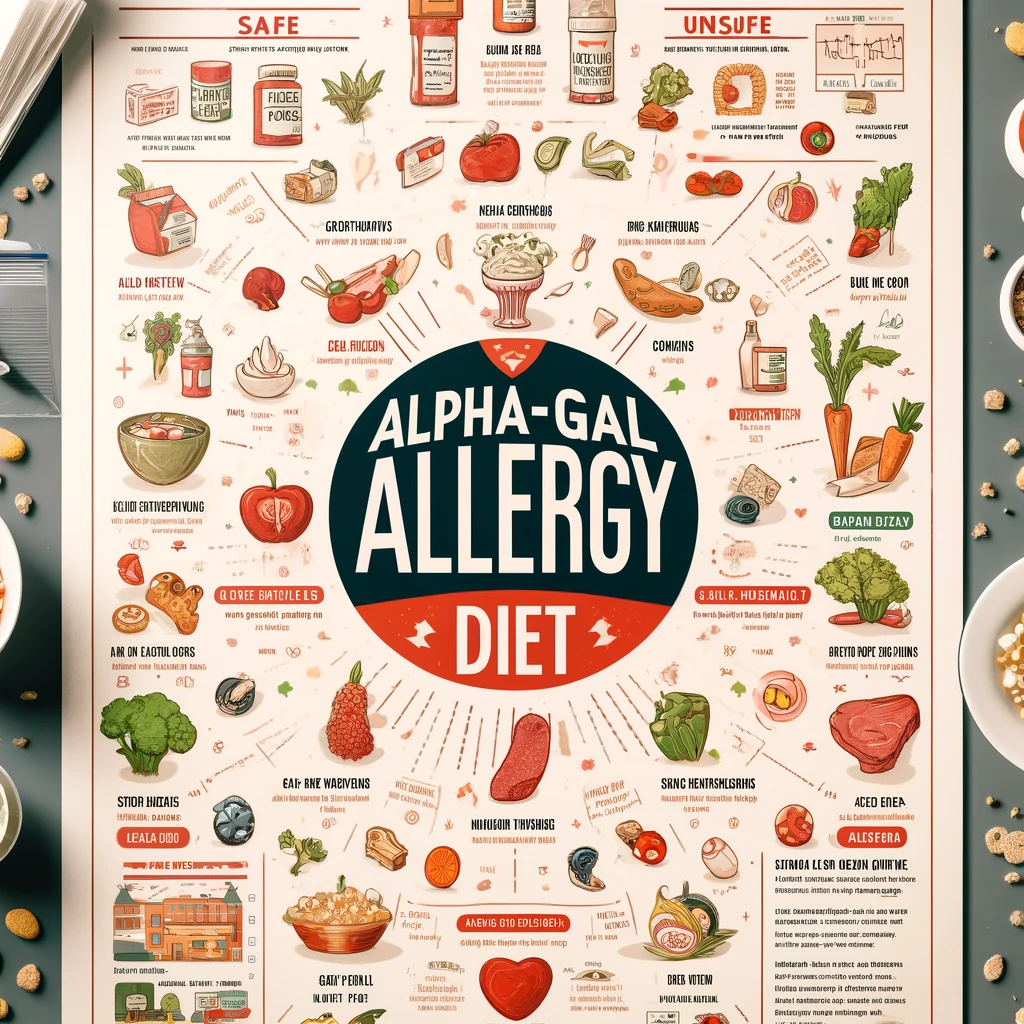Navigating the Misconceptions of the Alpha-Gal Allergy Diet
Think an alpha-gal allergy is just about skipping a steak? Think again! This condition goes far beyond simply avoiding red meat and involves a deep dive into all aspects of diet and lifestyle. Let’s break down the facts about alpha-gal allergy, debunk the common myths, and explore how to safely navigate your diet.
Alpha-gal allergy, often shrouded in myths and misconceptions, is much more than a mere inconvenience. It’s a serious medical condition that requires careful dietary considerations. Most people assume that avoiding beef, pork, and lamb is enough, but there’s more to it. This allergy can affect every part of your diet, including some less obvious foods and products. In this post, we’ll clear up the confusion and provide you with a clear guide on how to manage your diet effectively if you’re dealing with this unique allergy.
Click to see an other blog for allergy
Understanding Alpha-Gal Allergy
What is Alpha-Gal Allergy?
Alpha-gal syndrome (AGS) is triggered by a sugar molecule found in the meat of mammals and some other products derived from mammals. The unusual aspect of this allergy is that it is transmitted through a tick bite—specifically, bites from the Lone Star tick. This can sensitize your immune system to alpha-gal, leading to allergic reactions hours after consuming certain foods, a trait that distinguishes it from other food allergies.
Diagnosis and Symptoms:
Diagnosing alpha-gal allergy involves more than just identifying symptoms; it requires understanding the connection between tick bites and subsequent reactions to mammalian meat and products. The symptoms can vary significantly and may include anything from mild indigestion to severe allergic reactions like anaphylaxis. Common signs to watch for include hives, gastrointestinal distress, and even respiratory issues, which can occur 3 to 6 hours after ingestion.
“How to diagnose alpha-gal allergy symptoms” becomes a crucial query for many. It typically involves blood tests for specific antibodies and a review of both dietary habits and history of tick exposure. Due to the delayed nature of reactions, tracking what and when you’ve eaten is key to pinpointing this allergy.
Key Dietary Considerations:
Navigating the diet for someone with alpha-gal allergy involves more than avoiding obvious meats like beef, pork, and lamb. It’s critical to understand that some dairy products, gelatins, and other food additives can also pose risks. Learning to read labels for hidden alpha-gal sources is an essential skill for managing this allergy effectively.
By understanding what alpha-gal allergy is and the complexities of diagnosing it, those affected can make informed choices about their diet and lifestyle. Proper management and awareness are vital, as even small amounts of alpha-gal can trigger a reaction. Armed with the right knowledge, you can lead a healthy, reaction-free life.
Stay tuned as we delve deeper into which foods are safe and which to avoid, providing you with comprehensive food guides and practical tips for managing your alpha-gal allergy diet effectively.
Demystifying the Alpha-Gal Allergy Diet: It’s More Than Just Meat
If you think managing an alpha-gal allergy is as simple as skipping the steak and bacon, it’s time to dig a bit deeper. This allergy requires vigilance beyond just the meat aisle, extending to dairy, supplements, and even some medications. But don’t worry, navigating this can be straightforward once you know what to look out for. Let’s get into the essentials of the alpha-gal allergy diet and the comprehensive food guides that will make meal planning a breeze.
Click to see an other blog for Alpha-Gal Allergy Diet
Key Components of an Alpha-Gal Allergy Diet
Understanding what to eat and what to avoid is crucial for anyone managing alpha-gal allergy. Here are the dietary adjustments that can make a huge difference:
Safe Foods for Alpha-Gal Allergy:

- Poultry and Seafood: Chicken, turkey, and fish are completely free from alpha-gal and are excellent sources of protein.
- Fruits and Vegetables: All fruits and veggies are safe. They’re not just safe; they’re a vital part of a balanced diet.
- Dairy Alternatives: Many who have alpha-gal allergy can still enjoy dairy alternatives like almond milk, coconut milk, and other plant-based options that provide calcium and vitamin D without the risk.
Foods to Strictly Avoid:
- Red Meats: This includes beef, pork, lamb, and venison. Yes, all the obvious suspects.
- Certain Dairy Products: Especially those from mammals. Hard cheeses and some yogurts might be okay, but always check with your allergist.
- Gelatins and Fats: Many jellies, candies, and even marshmallows contain gelatin derived from mammals. Similarly, some fats used in commercial kitchens can be problematic.
Reading Labels:
One of the best skills you can develop is label reading. This isn’t just about checking for meat; it’s about spotting hidden alpha-gal triggers like gelatin, whey, and certain types of magnesium stearate, which might be sourced from mammals.
Comprehensive Food Guides
Navigating the grocery store with alpha-gal allergy doesn’t have to be a daunting task. Here’s a breakdown to keep your shopping cart safe:
Safe Foods for Alpha-Gal Allergy
Stocking your kitchen with alpha-gal safe foods is the first step to worry-free eating. Here’s what you can freely enjoy:
- Grains and Legumes: All grains, like rice, wheat, and oats, are safe, as are legumes like beans and lentils.
- Eggs: Eggs are a great source of protein and are completely alpha-gal free.
- Herbs and Spices: Flavor your meals without fear with any herbs and spices.
Foods to Avoid
Avoiding danger foods is just as important as picking the right ones:

Avoid the Food
- Meat Stocks and Broths: Often, these are derived from mammalian sources and can be hidden in soups and sauces.
- Marinated Foods: Unless you can verify the ingredients, marinated foods in stores often contain unsafe additives.
Eating Out with Alpha-Gal Allergy:
When dining out, always be upfront about your dietary restrictions. Many restaurants are now familiar with alpha-gal and can accommodate with safe cooking methods and ingredients. A little communication goes a long way in ensuring a safe and enjoyable meal.
Understanding these key dietary components and how to navigate food choices will empower you to manage your alpha-gal allergy effectively. Remember, it’s not just about avoiding red meat. It’s about making informed choices that keep your meals safe and satisfying.
Meal Planning and Eating Out: Simplifying the Alpha-Gal Allergy Diet
Many people think that having an alpha-gal allergy means a lifetime of bland and limited food options. Let’s bust that myth! With a little creativity and preparation, you can enjoy a diverse and delicious diet that keeps you safe and satisfied. Here’s how to master meal planning and handle dining out with alpha-gal allergy.

Meal Planning and Recipes
Creating a meal plan when you have alpha-gal allergy doesn’t have to be a chore. It’s all about knowing your safe ingredients and getting a bit creative with how you use them.
Alpha-Gal Friendly Recipes:
- Breakfast: Start your day with a smoothie bowl topped with a variety of fruits, seeds, and a splash of coconut milk. Or how about some scrambled eggs with spinach and mushrooms?
- Lunch: A chickpea salad with a variety of veggies and a tangy vinaigrette makes a nutritious midday meal.
- Dinner: Grilled salmon with quinoa and steamed broccoli is not only alpha-gal safe but also hearty and fulfilling.
Each recipe here avoids all mammalian products and focuses on enriching the diet with other proteins and nutrients. This ensures that meals are balanced and prevent any nutritional deficiencies.
Eating Out with Alpha-Gal Allergy:
When dining out, transparency is your best friend. Communicate your dietary restrictions clearly:
- Speak Up: Always inform the staff about your allergy. Most restaurants are willing to accommodate your needs and can offer safe alternatives.
- Choose Wisely: Opt for seafood or vegetarian restaurants, as these are less likely to use or cross-contaminate with mammalian products.
- Double-Check: Don’t hesitate to ask about ingredients in dishes. Better safe than sorry!
Managing Alpha-Gal Allergy at Home and Beyond
Living with alpha-gal allergy extends beyond just careful food selection; it’s about creating an environment that supports your dietary needs.
Daily Management Tips:
- Kitchen Safety: Dedicate areas in your kitchen for preparing and storing alpha-gal safe foods to avoid cross-contamination.
- Ingredient Substitutions: Learn to substitute problematic ingredients with safe alternatives. For example, use chicken broth instead of beef broth.
- Education: Educate family and friends about your allergy to ensure they understand how to support you, especially when they prepare meals or host events.
Traveling with Alpha-Gal Allergy:
Traveling can be challenging but planning ahead makes it manageable:
- Pack Snacks: Bring along safe snacks to avoid being caught hungry without suitable options.
- Research Restaurants: Look up restaurants and grocery stores in advance that cater to dietary restrictions like yours.
- Travel Kit: Always have your medication and a travel card that explains your allergy in the local language if you’re going abroad.
By integrating these strategies into your daily routine and planning ahead for unusual situations like travel or dining out, you can manage your alpha-gal allergy effectively without feeling restricted. Remember, the key to a successful diet management is knowledge and preparation.
Stay tuned for more insights on additional resources and support networks that can make living with alpha-gal allergy more manageable. Together, we can transform this journey into one of discovery and enjoyment rather than limitation.
Empowering Yourself with Additional Resources and Support for Alpha-Gal Allergy
Contrary to common belief, being diagnosed with alpha-gal allergy doesn’t mean you have to navigate your condition alone or without ample resources. In fact, there’s a wealth of information and support networks available that can not only make managing this allergy easier but also connect you with others who are facing similar challenges.
Additional Resources and Support
Managing an alpha-gal allergy can seem daunting at first, but with the right resources and support, it can become much more manageable. Here are some avenues where you can find help and information:
1. Educational Resources:
- Books and Online Articles: There are several comprehensive books and countless articles dedicated to understanding and managing food allergies, including alpha-gal. These can provide detailed dietary guidelines and tips on avoiding triggers.
- Websites: Sites like the American Academy of Allergy, Asthma & Immunology (AAAAI) and Food Allergy Research & Education (FARE) offer up-to-date information and advice. They also have sections specifically for alpha-gal allergy.
- Blogs and Forums: Joining online communities can be incredibly helpful. Websites like HealthUnlocked or Reddit have active forums where you can share experiences, recipes, and tips with others who understand exactly what you’re going through.
2. Finding Professional Help:
- Allergists and Dietitians: Locating a healthcare provider who specializes in allergies can significantly improve your quality of life. They can provide personalized advice and treatment plans. If you’re unsure where to start, online directories or referrals from your primary healthcare provider are good options.
- Support Groups: Many communities offer support groups for individuals with food allergies. These groups provide a platform to meet others, share experiences, and learn from each other in a supportive environment. Check community centers and hospitals for local groups or online for virtual meetings.
3. Advocacy and Awareness:
- National and Local Allergy Organizations: Getting involved with organizations that advocate for allergy awareness and safety can empower you and help others. They often campaign for better labeling laws and educate the public about allergies, improving safety and understanding for everyone.
4. Utilizing Social Media:
- Follow Influencers and Hashtags: Social media platforms like Instagram and Facebook feature influencers who focus on living with allergies. These platforms can be great sources of inspiration for recipes and lifestyle tips. Following hashtags related to alpha-gal allergy can also keep you connected with the latest posts and community advice.
By leveraging these resources, you can enhance your understanding of alpha-gal allergy and feel more in control of your daily management. Remember, the goal is to live a full and active life, and with the right support and information, it’s entirely possible.
Embracing Life with Alpha-Gal Allergy
Navigating life with alpha-gal allergy may seem challenging at first, but with the right approach and resources, it’s entirely possible to live a fulfilling and vibrant life. Through understanding the dietary needs, leveraging extensive resources, and connecting with supportive communities, individuals affected by this condition can manage their symptoms effectively and enjoy a rich, varied diet.
The Importance of Awareness and Adaptation:
The journey starts with proper awareness—knowing not just the obvious foods to avoid like red meat but also the less obvious ones that might contain alpha-gal. This requires adaptation in how we shop, cook, and even eat out. The challenge isn’t just in avoidance but in making informed choices that ensure safety and health. Embracing these changes positively can transform the management of this allergy from a burden into a manageable aspect of life that encourages healthier eating habits.
Pros and Cons of Managing Alpha-Gal Allergy:
Living with alpha-gal allergy comes with its set of challenges. On the downside, it requires constant vigilance and can impose a sense of restriction, especially in social settings like parties or dinners out, where options might be limited. It can also lead to anxiety around accidental exposure. However, there are significant benefits to this diligent management. It promotes a deeper understanding of food and nutrition, often leading to healthier eating habits overall. Moreover, the community and resources available for support can greatly enhance quality of life and provide a network of encouragement and advice.
Final Verdict:
The key to thriving with alpha-gal allergy lies in education and engagement. By staying informed about your condition, connecting with others through support groups, and utilizing professional resources, you can navigate your dietary restrictions more comfortably and confidently. Remember, with the right knowledge and support, you can not only manage your allergy effectively but also turn it into an opportunity for embracing a healthier lifestyle.
In summary, while alpha-gal allergy does pose its unique set of challenges, with the right approach, these can be successfully managed. It’s about more than just avoiding certain foods; it’s about creating a lifestyle that accommodates your needs while still being rich and enjoyable.
Frequently Asked Questions About Alpha-Gal Allergy
What exactly is alpha-gal allergy?
Alpha-gal allergy is a reaction to a sugar molecule called alpha-gal, which is found in the meat of mammals like beef, pork, and lamb. Unlike typical food allergies, it’s often triggered by a tick bite, specifically from the Lone Star tick, which sensitizes your body to this sugar molecule.
How do I know if I have alpha-gal allergy?
The symptoms can vary but generally include hives, digestive upset, and in severe cases, anaphylaxis—often occurring 3 to 6 hours after consuming mammal-based products. If you suspect you have this allergy, a blood test can confirm the presence of alpha-gal antibodies.
Can I eat chicken or fish if I have alpha-gal allergy?
Yes, chicken and fish are safe to eat because they don’t contain alpha-gal. These can be excellent sources of protein for those with this allergy.
What should I avoid if I have alpha-gal allergy?
Avoid all red meats like beef, pork, and lamb. You should also be cautious with dairy products, gelatin, and certain fats and supplements that may contain animal derivatives.
How can I safely eat out with alpha-gal allergy?
When eating out, always inform your server about your allergy. Opt for places that can cater to special dietary needs and always double-check ingredients in dishes, even if they seem safe.
Are there any hidden sources of alpha-gal I should be aware of?
Yes, alpha-gal can be found in some less obvious products like gelatin (used in candies and desserts) and certain medication capsules. Always read labels and ask your pharmacist to ensure medications are safe for your condition.
What are some strategies for managing alpha-gal allergy at home?
Keep your kitchen organized to avoid cross-contamination, educate your family and friends about your allergy, and learn to substitute ingredients in recipes safely. Planning and preparation are key.
Where can I find support and more information?
Several online resources and communities offer support. Websites like the American Academy of Allergy, Asthma & Immunology (AAAAI) provide detailed information. Joining online forums and support groups can also help connect you with others facing similar challenges.





